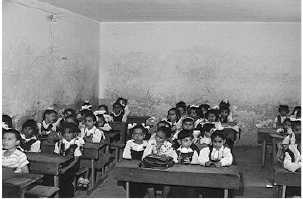Whose No Fly Zones?
Without authorization from the UN, the US and Britain established "no-fly zones" over Iraq. The
stated objective for these zones was to prevent the northern minority Kurdish population and
southern Shi'ite Muslim population from attacks by the secular government of Iraq, which is
comprised of mostly Sunni Muslims. Under the auspices of this plan the US and Britain have
established constant armed surveillance from bases in adjacent countries.
Since weapons inspectors left in late 1998 (see side bar), these patrols have dropped bombs on an
average of once every three to seven days in an apparent campaign of low level intimidation and
terror. Agence France Presse reports that since the "Desert Fox" campaign began in December
1998 these bombings have killed 300 Iraqis, mostly civilians, and wounded hundreds more.
|
  
|
Weapons of Mass Destruction
The stepped up bombing of the "Desert Fox" campaign was preceded by the voluntary departure of
the UN inspection team (UNSCOM) headed by Richard Butler. Former UN weapons inspector
Scott Ritter "argues by 1996 UNSCOM had enough evidence to verify that Iraq's military had been
incapacitated. Still the US pressed investigators into confrontations" (Albany Times Union,
7/18/01). Butler knew his report would be used as an excuse by the US to justify immediate
bombing, so he had the inspections team evacuate for their own safety.
As it happens, the bombing in late 1998 not only failed to force Iraq to comply with inspections--
the weapons team hasn't been allowed back in the country since. The U.S. has bombed Iraq about
200 times since then, including at least nine times since September 11th. The new weapons team,
UNMOVIC, is receiving money from Iraq's "Oil-for- Food" program to sit in its offices in New
York and wait for the day they can return.
Disarmament of the region is one goal of UN Resolution 687 (1991), but it is being applied totally
to Iraq, the most scrutinized country in the region, while Israel maintains nuclear weapons.
|
Iraq and the "War on Terrorism"
As the bombing of Afghanistan continues, the Bush administration is preparing to broaden its so-
called "War on Terrorism." Iraq has repeatedly been mentioned as a prime candidate, despite the
lack of any evidence linking Iraq with the events of September 11 or the antrhax mailings.
In the wake of the "Gulf War" and 11 years of sanctions, the Hussein regime has clearly defied
expectations that it would crumble from within. The US has made the best of this situation by
selling billions in weapons to neighboring Arab countries and establishing multiple permanent
military bases in the region. It is just this type of US involvement that was cited by Osama bin
Laden as one of the reasons for his anger towards America.
It is fairly clear that many people in the region, and probably many people in Iraq, would prefer
that Saddam Hussein not be in power. If the alternative were a US-backed government which was
installed to make the oil riches of Iraq available to American-based companies, that would not best
serve the interests of the Iraqi people.
The war on Afghanistan is an entirely different situation, involving armed groups opposed to the
brutal but minimally armed Taliban government. In contrast, the Iraq National Congress, the main
opposition group favored by the US, is made up of mostly exiled intellectuals living in Europe.
Perhaps it would be best to accept that Iraq is qualitatively disarmed, lift the sanctions so that the
people can regain their health and their economy, and then take steps to encourage a democratic
change in leadership.
SAY NO TO BOMBS! SAY NO TO SANCTIONS!
SAY YES TO NONVIOLENT AND LEGAL
CONFLICT RESOLUTION!
photo from www.vitw.org

For more information contact:
Voices in the Wilderness/Portland (503) 299-4798
Northwest Vets for Peace (503) 324-1804
Military Draft and Counseling Project
of the War Resister's League (503) 238-0605
Reed College Peace Group
Milwaukie Presbyterian Church
PSU Students for Unity
PSU Rearguard (503) 725-2965
This flyer was prepared January 2002 by the
Peace and Justice Works Iraq Affinity Group
PO Box 42456 e-mail pjw@agora.rdrop.com
Portland, OR 97242 www.rdrop.com/~pjw/Iraq.html
(503) 236-3065 Contact us about emergency and regular meetings!
back to page 1 of this fact sheet
Iraq Affinity Group home page
Peace and Justice
Works home page